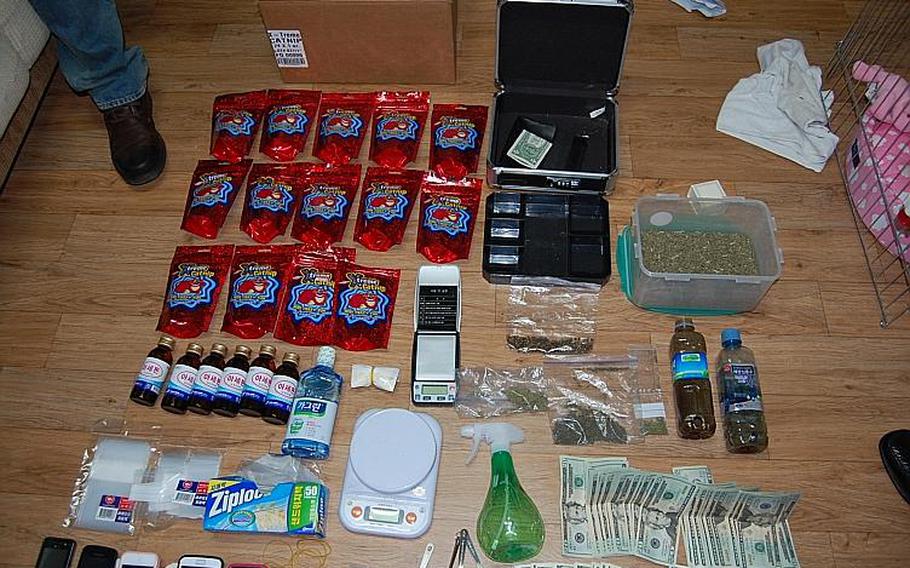Asia-Pacific
Four US soldiers in Korea detained, suspected of dealing synthetic marijuana
Stars and Stripes December 11, 2012

This undated photo shows items confiscated Oct. 29, 2012, from the home of a U.S. soldier suspected of manufacturing and distributing Spice. The items include acetone and bags of catnip, which were mixed with synthetic marijuana that had been mailed to him in South Korea to create what South Korean police describe as a new blend of the drug. (Courtesy Gyeonggi Provincial Police Agency)
SEOUL — Four Camp Casey soldiers are in custody on suspicion of selling the designer drug Spice to other servicemembers and South Korean citizens, according to Korean police.
The police referred to all four as deserters. At least two have been described as accomplices during court proceedings for Pvt. Michael Lehmkuhl of the 2nd Infantry Division and former USFK soldier Arin Bergquist, who will be sentenced next week for their role what has been described as a major Spice smuggling and distribution ring.
A news release from the International Criminal Investigative Service of the Gyeonggi police agency said all four deserters imported synthetic marijuana via international mail, camouflaging the drug as coffee grounds, and then mixed it with catnip, acetone and a Korean mouthwash before selling it. It was unclear how closely the four worked together, if at all.
“We are aware of the ongoing investigation and have cooperated fully with Korean authorities as they continue to conduct a joint
investigation with the U.S. Criminal Investigation Command,” said Col. Andrew Mutter, 8th Army spokesman. “Two soldiers are currently in USFK custody, one is currently in Republic of Korea custody, and one has completed his Korean mandated confinement and was released.”
No names have been released, with officials citing the ongoing investigation, and no charges have been filed.
“Stopping the use of drugs by our personnel is a priority,” said Mutter. “We take these issues very seriously and are cooperating with the (Korean National Police) to employ every possible tool at our disposal to fight and prevent the use of drugs.”
It was unclear why the 8th Army and the ICIS released the information Monday. Police said three of the suspects were apprehended in May and July after going absent without leave in February and March.
The 8th Army statement said the fourth was nabbed Oct. 29. It said he was a deserter who had been been convicted in a January court martial for “various offenses” including drug distribution, and was sentenced to a 120-day confinement and was to be given a bad conduct discharge. It did not specify when he went AWOL.
South Korean police and officials with the Camp Casey Criminal Investigation Command, commonly referred to as CID, searched his residence after his arrest and found Spice, ingredients used to make the drug and a large amount of U.S. currency. The soldier used money earned from selling the drug to pay living expenses for himself and his live-in girlfriend, and to buy a luxury car, police said.
Spice use among U.S. troops in South Korea has received widespread attention in recent months, following the bust earlier this year of what South Korean authorities have described as the largest ever drug-smuggling ring involving U.S. Forces Korea servicemembers.
According to court testimony, Bergquist ordered Spice, a form of synthetic marijuana, from an internet site. At least a half-dozen others, including Lehmkuhl, were involved in selling it between August 2011 and January 2012.
Prosecutors have recommended Lehmkuhl be given 12 years in prison, an unusually long sentence in South Korea, to show the country does not tolerate U.S. military crime. They recommended that Bergquist be sentenced to seven years because he cooperated with authorities.
Gyeonggi police agency’s ICIS announced Monday it was investigating 30 people for manufacturing, selling or using Spice, including the soldier who was apprehended in October.
According to the statement, hair and urine testing conducted by the National Forensic Service showed that the other 26 people under investigation used Spice, though none admitted to buying or using it. None of the 26, which include 13 foreigners and 13 South Koreans, has been arrested, according to the ICIS. A Korean official told Stars and Stripes that the 13 foreigners are U.S. soldiers, but U.S. military has not confirmed this.